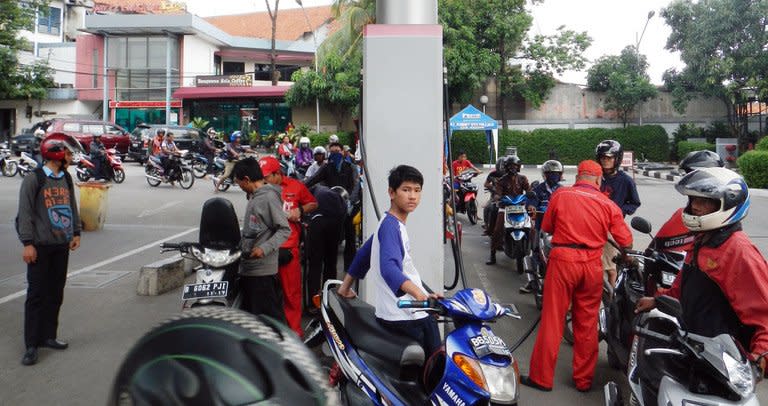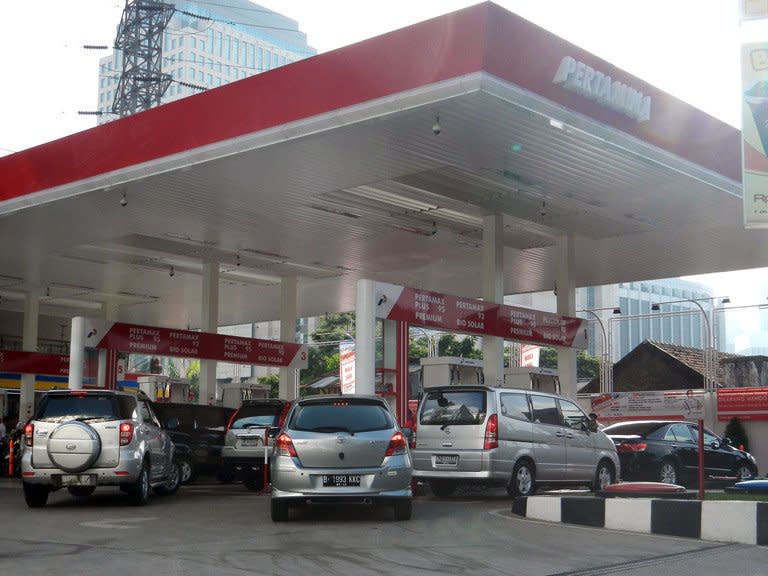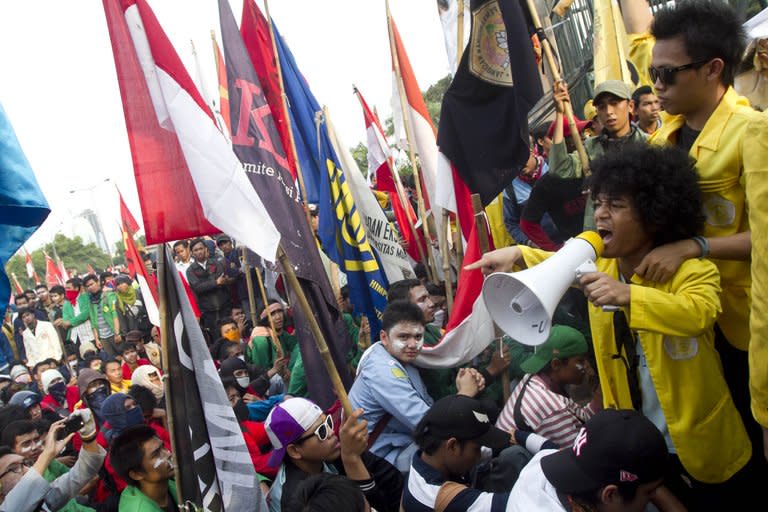Indonesia seeks to tackle explosive fuel subsidies
The Indonesian government's pledge to reduce generous fuel subsidies which will push up prices for motorists has taken it onto politically treacherous ground before elections in 2014. With mounting concern over the economic damage being wrought by an energy subsidy which gobbles up more than 16 percent of the state budget, the government has set out plans to raise fuel prices for the first time in five years. It is hoping to avoid sparking social unrest or damaging its chances at the polls, but there are already fears that the hike will not just hit the increasing number of motorists in Southeast Asia's biggest economy. The move could also push up inflation across the board due to the higher cost of transporting goods. "I know the price of meat, flour, everything will go up too. This is very important for me," Hadi Sukamto, who sells noodles at a street stall in downtown Jakarta, told AFP. "Office workers would think twice before buying my noodles, and would rather bring lunch from home." Fuel subsidies have been a flashpoint issue for decades in Indonesia, and lowering them in the past has led to nationwide protests. Subsidised fuel is regarded as one of the few government handouts for millions in a country where half the population still lives on under $2 a day and which has only the bare bones of a welfare system. The new plans will see the price of petrol for private cars rise by more than 40 percent as soon as next month, Energy Minister Jero Wacik announced in the past week, conceding that it would affect poorer citizens. "If there is a change in the fuel price, of course it will have an impact on inflation, and this is when it will hit the poor," he said. Lawmakers voted down a price rise last year in the face of nationwide protests, despite having been expected to pass it. The government is more confident it will go through this time, after changing the rules so that a parliamentary vote is no longer needed. But the move comes at a difficult time for President Susilo Bambang Yudhoyono, with elections looming and his Democratic Party embroiled in a string of corruption scandals. "The equation is simple -- a fuel hike means lower popularity for the government because prices are the voters' number one concern," Kuskridho Ambardi, a political analyst from Gadjah Mada University, told AFP. Indonesia's addiction to cheap fuel stems from the days of dictator Suharto, who used subsidies to shore up support for his repressive regime. A petrol price hike in 1998 was one of the triggers for student riots which led to his downfall. More recent attempts to cut the subsidies in Indonesia have also been fraught. The popularity of President Yudhoyono's government plummeted as he gradually hiked prices between 2005 and 2008. It only started to recover when he partially rolled back the increases towards the end of 2008. Now the government is again steeling itself to tackle the thorny issue. The price of fuel has been kept at 4,500 rupiah ($0.46) a litre since 2008, about half its actual current value and one of the cheapest in Asia. Under the new plan it is expected to go up to around 6,500 rupiah for private cars. Ministers hope to temper resistance by keeping full subsidies for motorcycles and public transport, used by many in the sprawling, archipelago nation of 240 million. The announcement nevertheless sparked immediate anger from unions, which are threatening to organise protests on May 1. Economists have also lambasted it as a half-measure which will not make a big impact on subsidies they blame for a widening current account deficit that is threatening growth. "The government only has the guts to hike the price for cars, the safest move it can make for now," energy analyst Pri Agung Rakhmanto told AFP. Fuel subsidies have been a problem for many emerging Asian nations, with countries from India to Malaysia having faced huge pressure from their citizens to keep them at high levels, even as global oil prices surged.




